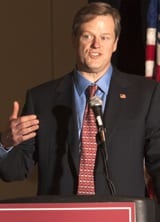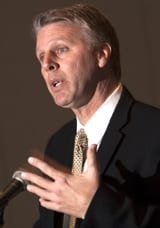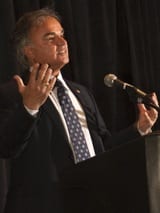Who is a member?
Our members are the local governments of Massachusetts and their elected and appointed leadership.
Three of the major candidates for governor this fall – Republicans Charles Baker and Christy Mihos and independent Tim Cahill – spoke to MMA members during a candidates forum held as part of the MMA Annual Meeting on Jan. 23 in Boston.
All three candidates agreed that cities and towns should have the same authority the state has to make health care plan decisions outside of collective bargaining, an issue that is a top MMA priority.
Incumbent Gov. Deval Patrick, a Democrat, did not attend the forum, explaining that his policy is to wait until he formally announces his candidacy later this year before participating in candidate events.
Each candidate had an opportunity to address the audience individually and then respond to questions from local officials. The candidates were not on stage at the same time, as the event was not a debate format.
Veteran TV and radio journalist John Henning moderated the special Annual Meeting closing session.
 Baker touted his experience as a cabinet member in the administration of Gov. William Weld during the recession of the early 1990s as well as his role a decade later leading Harvard Pilgrim Health Care out of receivership.
Baker touted his experience as a cabinet member in the administration of Gov. William Weld during the recession of the early 1990s as well as his role a decade later leading Harvard Pilgrim Health Care out of receivership.
“I know a bit about getting into a sticky wicket and getting out of it,” he said.
Baker, who served as Health and Human Services secretary and later as Administration and Finance secretary, said that as governor he would work to reform the state pension system. He said the steps that have been taken are insufficient, and he would aim to make it more difficult for employees to qualify for larger pensions based on the final years of their employment history. He said he would seek to raise the minimum retirement age from 55 to 60.
Applauding local officials for “restructuring and reconfiguring your own programs to make life work within your budgets,” Baker said that he would not support cuts in local aid. He said rolling back the state sales tax to 5 percent is a laudable objective, but added, “I don’t think it’s doable straight out of the gate.”
Decrying the high cost of energy in Massachusetts, Baker argued that alternative energy projects should be pursued only if they are likely to be cost-effective.
Baker said the state needs more coherent tax and regulatory policies in order to boost economic development.
“We have to give people a predictable and reliable sense about what their obligations to the Commonwealth are going to be, whether they’re a small business or a mid-sized business, or a corporation,” he said.
 Cahill, the state treasurer for the past seven years, expressed concern about the projected $3 billion budget gap the state is facing for fiscal 2011.
Cahill, the state treasurer for the past seven years, expressed concern about the projected $3 billion budget gap the state is facing for fiscal 2011.
“We’re not bringing in enough money or we’re spending too much money,” he said. “If you can’t figure out how to pay for something … you shouldn’t be offering it.”
Cahill, who also served for 15 years as a councillor in Quincy and ran a small business, supports a rollback of the state sales tax rate to 5 percent and elimination of the sales tax on alcohol, but said a ballot proposal to reduce the sales tax to 3 percent is “too harsh and too fast.”
He pointed out that 70 percent of state revenue comes from just two sources – the personal income tax and capital gains taxes – both of which are not always stable. He said the state needs to encourage business growth, in part by re-examining business costs, corporate tax rates, and the cost of unemployment insurance.
“We’ve lost our competitive edge,” he said. “The primary solution to our problems is to get people back to work.”
Cahill said he supports health plan design authority for cities and towns and full state funding of its share of the Police Incentive Pay Program. He opposes unfunded state mandates on cities and towns and said he would seek to remove some that already exist.
He said the state’s health care program is unsustainable.
“We solved the problem first and then we tried to figure out how to pay for it,” he said. “If we keep going on the road we’re going, we’re going to be in bankruptcy one day.”
 Mihos, who ran for governor in 2006 as an independent, said he is backing a ballot initiative that would cut the state sales tax from 6.25 percent to 3 percent. Though the proposal would put a major dent in the state’s tax collections, he added that he supports sending 40 percent of state revenue directly to cities and towns.
Mihos, who ran for governor in 2006 as an independent, said he is backing a ballot initiative that would cut the state sales tax from 6.25 percent to 3 percent. Though the proposal would put a major dent in the state’s tax collections, he added that he supports sending 40 percent of state revenue directly to cities and towns.
Mihos argued that the proposed sales tax reduction would create 39,000 jobs and make businesses – especially those near the border of other states – more competitive.
“There is no one coming to Massachusetts to create jobs because no one can afford to do business here,” Mihos said. “We have to put money back in the people’s pocket. The only way we can do that is by lowering the [tax] burden.”
In order to boost local aid, Mihos said he would reduce the state government work force by 10 percent.
“I’m looking to skinny down state government and put the money to work at the local level, where it works best, where you spend more responsibly,” he said.
Mihos said he opposes resort-style casinos, but favors legalized sports betting.
The former director of the Massachusetts Turnpike Authority said that as governor he would shut down all branch locations of the Registry of Motor Vehicles.
“All registry business that can’t be done online will be done in your city or town hall,” he told municipal leaders.
Municipalities would receive funding to hire additional employees and would retain revenue from the registry fees they collect, he said.
Mihos also proposed funding the Police Incentive Pay Program, known as the Quinn Bill, by transferring $40 million that currently provides health care subsidies for legal immigrants.
Written by: MMA Publications Editor & Web Director John Ouellette and MMA Associate Editor Mitch Evich